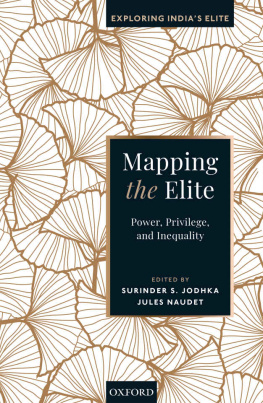Surinder S. Jodhka and Jules Naudet - Mapping the Elite
Here you can read online Surinder S. Jodhka and Jules Naudet - Mapping the Elite full text of the book (entire story) in english for free. Download pdf and epub, get meaning, cover and reviews about this ebook. year: 2019, publisher: OUP India, genre: Politics. Description of the work, (preface) as well as reviews are available. Best literature library LitArk.com created for fans of good reading and offers a wide selection of genres:
Romance novel
Science fiction
Adventure
Detective
Science
History
Home and family
Prose
Art
Politics
Computer
Non-fiction
Religion
Business
Children
Humor
Choose a favorite category and find really read worthwhile books. Enjoy immersion in the world of imagination, feel the emotions of the characters or learn something new for yourself, make an fascinating discovery.
- Book:Mapping the Elite
- Author:
- Publisher:OUP India
- Genre:
- Year:2019
- Rating:5 / 5
- Favourites:Add to favourites
- Your mark:
- 100
- 1
- 2
- 3
- 4
- 5
Mapping the Elite: summary, description and annotation
We offer to read an annotation, description, summary or preface (depends on what the author of the book "Mapping the Elite" wrote himself). If you haven't found the necessary information about the book — write in the comments, we will try to find it.
Mapping the Elite — read online for free the complete book (whole text) full work
Below is the text of the book, divided by pages. System saving the place of the last page read, allows you to conveniently read the book "Mapping the Elite" online for free, without having to search again every time where you left off. Put a bookmark, and you can go to the page where you finished reading at any time.
Font size:
Interval:
Bookmark:
Exploring Indias Elite
Series Editors
Surinder S. Jodhka and Jules Naudet
The last decade of the twentieth century was an important turning point in the contemporary human history. The end of Cold War, new revolutions in telecommunication technologies, and the ensuing processes of globalization significantly altered the ways in which the human life has been imagined and organized. The global capitalist economies saw an unprecedented process of resurgence, which also generated a huge amount of new wealth, at least in some regions and countries of the world. Neoliberal economic philosophy and the accompanying policy regimes, the new norm of organizing economic life that came to be accepted across nation-states in the postCold War world, celebrated individual entrepreneurship and de-legitimized older ideas of parity and fair distribution.
An obvious offshoot of this has been the growing concentration of wealth and power in a few hands. This is not simply a matter of economic disparity. When merely one per cent super-rich own half of all the global wealth, they also seek to shape political regimes, cultural trends, and social space. Escalating economic disparities poses serious challenges to democracy. In countries of the developing world, extreme and rigid inequalities also hinder the processes of economic growth, extension of basic human entitlements, and citizenship rights across populace. The early twenty-first century is, thus, unsurprisingly marked by a revival of populism and authoritarianism across the world.
India is being widely seen as a significant emerging economic and political power in the world today. Despite having the largest number of chronically poor globally, it is also home to a sizeable number of rich and super-rich. It has been among the fastest-growing economies of the world during the post-reforms period. Equally important are its political dynamics. With increasing participation of erstwhile-marginalized sections in the electoral process, the social profile of Indias political elite has been changing, making way for those coming from the middle and lower strata of the traditional social order, thus broadening the social base of political power.
This book series is to provide a platform to scholars working on the subject to publish their work and develop a stock of scholarship that would enable us to understand the dynamics of inequality, power, and emergent social structures in India.
Exploring Indias Elite
Mapping
The Elite
Power, Privilege, and Inequality
Edited by
Surinder S. Jodhka
and
Jules Naudet


Oxford University Press is a department of the University of Oxford.
It furthers the Universitys objective of excellence in research, scholarship,
and education by publishing worldwide. Oxford is a registered trademark of
Oxford University Press in the UK and in certain other countries.
Published in India by
Oxford University Press
2/11 Ground Floor, Ansari Road, Daryaganj, New Delhi 110002, India
Oxford University Press 2019
The moral rights of the authors have been asserted.
First Edition published in 2019
All rights reserved. No part of this publication may be reproduced, stored in
a retrieval system, or transmitted, in any form or by any means, without the
prior permission in writing of Oxford University Press, or as expressly permitted
by law, by licence, or under terms agreed with the appropriate reprographics
rights organization. Enquiries concerning reproduction outside the scope of the
above should be sent to the Rights Department, Oxford University Press, at the
address above.
You must not circulate this work in any other form
and you must impose this same condition on any acquirer.
ISBN-13 (print edition): 978-0-19-949107-0
ISBN-10 (print edition): 0-19-949107-0
ISBN-13 (eBook): 978-0-19-909791-3
ISBN-10 (eBook): 0-19-909791-7
Typeset in Adobe Garamond Pro 10.5/12.5
by The Graphics Solution, New Delhi 110 092
Printed in India by Nutech Print Services India
To
Centre for Social Sciences and Humanities/Centre de Sciences
Humaines (CSH), New Delhi, where it all began
Contents
Ajantha Subramanian
Jules Naudet, Adrien Allorant, andMathieu Ferry
Saurabh Dube
Namita Vijay Dharia
Sanam Roohi
Patrick Inglis
Ujithra Ponniah
Swethaa S. Ballakrishnen
Parul Bhandari
Surinder S. Jodhka and Jules Naudet
Inequality is endemic, a seemingly inescapable feature of human life present almost everywhere and at almost all times. Its forms and patterns may vary, but it is hard to find a society where inequality does not exist. Inequality matters because its presence is felt far and wide. It shapes and is constitutive of social relations, cultural values, spatial patterns, economic systems, and political regimes. It conditions and regulates human potentials, aspirations, and life-chances. Given its pervasive nature and multidimensionality, it has been a subject of interest for a range of expertseconomists, sociologists, historians, anthropologists, political scientists, geographers, and even fiction writerswho have deployed a variety of theories and concepts to capture its diversities and complexities. Given its sway, inequality has also been among the core moral and ethical concerns across human cultures and civilizations. It has been a source of many political contests, upheavals, and revolutions. It even finds mentions in religious ideas and ideologies the world over, positive and/or negative.
Since the early 1990s, new revolutions in telecommunication technologies, political shifts, and the ensuing processes of globalization have generated a huge amount of new wealth, at least in some regions and countries of the world. One of the major consequences of these shifts has been the increase and spread of inequality.
Given its phenomenal growth over the past decades, its study and analysis has also seen resurgence. While it is widely recognized that inequality is a multi-dimensional reality, most academic writings and discussions in the popular media tend to revolve almost exclusively around its economic dimensions, the growing disparities of income and wealth among individuals, social categories, or nation-states. Economic disparities are indeed very critical as they determine aspects of access and exclusion. The economists have also worked out robust methods and modes of calculating inequalities at the macro and micro levels for comparisons across societies and countries. Thomas Pikettys extremely influential work, Capital in the Twenty-First Century, published in 2014, and several other research writings and reports by individual economists and civil society groups have been quite successful in highlighting growing economic disparities in the world today. Given its nature, the economic aspect is also relatively easy to capture and measure.
The obvious academic and political response to such emergent trends has been to be concerned about the poorthose likely to experience greater degrees of vulnerability with growing disparities. This is indeed required and perhaps needs far greater attention than it has received so far in the mainstream economics and contemporary policy regimes in most parts of the world. However, the mainstreams concern for the poor or for poverty is not always seen as linked to growing inequalities. Many contemporary economists would actually argue that the two have nothing to do with each other. On the contrary, poverty tends to decline when an economy grows at a faster pace, yet italmost inevitablyis also likely to enhance income disparities.
Next pageFont size:
Interval:
Bookmark:
Similar books «Mapping the Elite»
Look at similar books to Mapping the Elite. We have selected literature similar in name and meaning in the hope of providing readers with more options to find new, interesting, not yet read works.
Discussion, reviews of the book Mapping the Elite and just readers' own opinions. Leave your comments, write what you think about the work, its meaning or the main characters. Specify what exactly you liked and what you didn't like, and why you think so.












